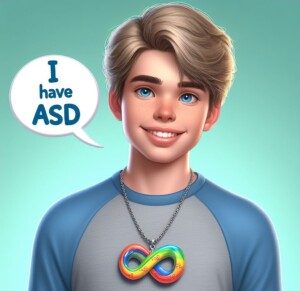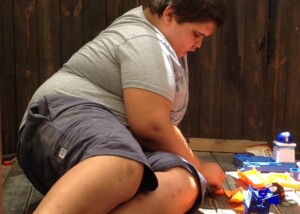Just find out someone has a few autistic kids? Feeling sorry for them? Well here’s why you SHOULDN’T.
I’m autistic and there better not be anyone feeling sorry for my parents.
Autism is a word that often comes with misconceptions and misplaced sympathies.
When someone learns that a friend or acquaintance’s child is autistic, it’s common to feel a pang of pity.
But instead of feeling sorry for parents of autistic children, we should be celebrating the unique journey they’re embarking on.
Autism Isn’t a Tragedy
Let’s dispel the myth that autism is a tragedy. A major autism organization once ran a PSA in which the voiceover referred to autism as a “tragedy.”
Nope, I don’t think so. Now, a ban on chocolate would be a tragedy.
Autism isn’t an illness that needs curing or fixing. It’s a neurodevelopmental difference that shapes how individuals perceive the world around them.
Autistic individuals have strengths and challenges, just like everyone else. It’s simply a different way of being, not a deficiency.
Diversity Enriches Society

©Lorra Garrick
Imagine a world where everyone thinks, acts and perceives things in the same way.
It would be monotonous, lacking in creativity and innovation.
Autism brings diversity to our communities, offering unique perspectives and talents that enrich our collective experience.
By embracing neurodiversity, we foster a more inclusive and vibrant society.
Perhaps autism is nature’s way of offsetting the excessively large number of boring people in this world.
Strengths of Autism

©Lorra Garrick
While autism presents challenges, it also comes with quite a few strengths.
Some Autistics even refer to these bonuses as superpowers.
Many autistic individuals possess exceptional abilities in areas such as pattern recognition, attention to detail, creativity and creative problem solving skills.
These strengths can lead to remarkable achievements in fields like science, technology, engineering and the arts.
Instead of focusing on the difficulties, let’s celebrate these remarkable talents.
Another superpower that’s far more prevalent in autism than in neurotypicality is a natural resistance to peer pressure, to a herd mentality, to jumping on the latest bandwagon.
Austistic people like to question pop culture rather than just mindlessly follow along.
Different, Not Less

©Lorra Garrick
Temple Grandin, a prominent autistic advocate, famously said, “I am different, not less.”
This statement encapsulates the essence of autism acceptance.
Autistic individuals may navigate the world in a way that differs from the majority, but they are not lesser because of it.
They have their own unique gifts and viewpoints to offer, deserving of respect and understanding.
Parenting Isn’t Defined by Challenges
Parenting an autistic child undoubtedly comes with its potholes (some small, some big), but then again, so does parenting any child for that matter.
Every child is unique, with their own set of needs and quirks, demands and temperaments, likes and dislikes.
While some aspects of raising an autistic child may require extra patience and understanding, it’s important to remember that parenting is a colorful journey filled with joys, triumphs and moments of profound connection.
And sometimes “being normal” can bring with it a greater potential for criminal behavior.
Reminds me of an episode of the hit TV show “Touched by an Angel” in which a man was angry and despondent that his unborn baby had tested positive for Down syndrome.
In a scene, he’s at a diner discussing the situation with his wife, when he notices a tall goodlooking teen boy, wearing a varsity jacket, begin entering the place.
The man says, “Why can’t our son be like that?”
Suddenly the boy opens fire for no apparent reason, and one of the bullets hits the man’s wife in the abdomen. The baby survives.
If you know someone with an autistic child, it’s a pretty safe bet that when they’re a teen, their parents won’t have to wonder where they are on Saturday night.
Community Support and Advocacy
Rather than pity, what parents of autistic children truly need is support and advocacy.
Feeling sorry for parents of autistic kids perpetuates negative stereotypes and stigmatization.
It reinforces the idea that autism is something to be pitied or ashamed of, rather than embraced and celebrated.
By shifting our way of looking at things to one of acceptance and understanding, we can create a world in which autism is seen as a different and often advantageous processing system, rather than as a handicap and something to feel shame about.
Don’t Pity People just Because Their Kid Is on the Spectrum

©Lorra Garrick
There’s no need to feel sorry for your neighbor because her seven-year-old daughter would rather spend a lot of time indoors following the latest news on a giant hurricane barrelling towards the Panhandle than play outside with a bunch of neighborhood kids who have all sorts of playthings at hand.
There’s no need to feel sorry for parents of autistic children — especially when parents of “normal” kids could get their heart broken one day upon learning that their prized teen is hooked on drugs or is running with the wrong crowd.
Autism is a unique and valuable aspect of human diversity.
Instead of focusing on struggles, let’s celebrate the strengths, achievements and contributions of autistic individuals!
 Lorra Garrick has been covering medical and fitness topics for many years, having written thousands of articles for print magazines and websites, including as a ghostwriter. She’s also a former ACE-certified personal trainer. In 2022 she received a diagnosis of Level 1 Autism Spectrum Disorder.
Lorra Garrick has been covering medical and fitness topics for many years, having written thousands of articles for print magazines and websites, including as a ghostwriter. She’s also a former ACE-certified personal trainer. In 2022 she received a diagnosis of Level 1 Autism Spectrum Disorder.
.










































